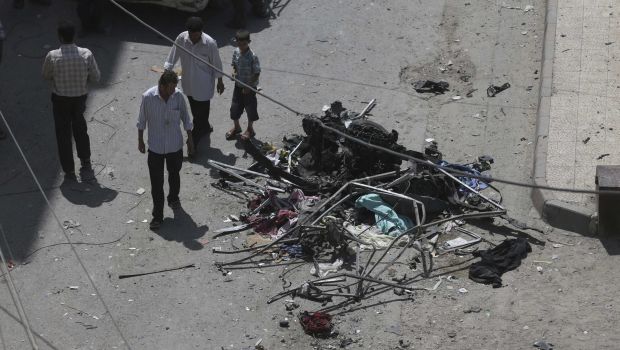Before she disappeared in December, Syrian human rights activist Razan Zaitouneh was being interviewed by an American TV journalist who asked her if she was worried about her safety, as the fighting encroached on the area where she was.
She said: “Personally I’m not afraid about myself anymore. Death became a normal thing to us in Syria. Maybe to the extent that we deal with it until . . . ” and then the phone line was cut.
We lost Razan Zaitouneh shortly after that telephone interview with the US channel, which was broadcast again in a video biography recently, compiled and presented by the international organization Vital Voices, when it gave Zaitouneh an award.
Months have passed since the disappearance of Zaitouneh, who was one of the most prominent Syrian rights activists, and who had gained the highest credibility and shown the most integrity in supporting freedom by recording violations in Syria, whether by the regime or by the opposition factions.
Razan lived with numerous serious risks until her kidnapping at the end of last year, together with fellow activists Samira Al-Khalil, Wael Hamada and Nazim Hamadi.
Since the disappearance of Zaitouneh and her friends in the area of Douma, which is under the control of Jaysh Al-Islam, led by Zahran Alloush, there have been persistent attempts to stop her being forgotten in the same way that dozens, even hundreds, of Syrians who have gone missing have been forgotten.
Forgetfulness: as much as it lessens the pain of our loss, as much as it gives us the feeling of guilt and shame for losing interest, and therefore succumbing to the wishes of those who made Razan and her friends disappear, to make us forget them and their plight, and accept the reality of the situation.
Here we have to admit that keeping an issue such as the kidnapping of Razan and her friends alive is not an easy task amid all the atrocities and tragedies, and amid the success of the Islamic State of Iraq and Syria (ISIS), which is attracting more and more regional and international attention, and overshadowing the atrocities committed by the Syrian regime, which led to the creation of ISIS in the first place.
The Syrian regime will not be concerned by the disappearance of Razan and her friends. It even may have a hand in it, especially with the many question marks that surround Alloush and his responsibility for the disappearance of a personality seen as the conscience of the Syrian revolution.
It is not absurd to link the disappearance of Razan to the weakening of the voice of Syrian civilians through the killing of activists and journalists, or kidnapping, incarcerating or forcing them to flee Syria, and to the substantial rise in violent extremist forces such as ISIS.
While not to chronicle the division that took place between the extremists and the civilian activists of the Syrian revolution, the kidnap of Razan and her friends was a defining moment in that division between one side and another, with the extreme side taking the lead.
It is true that this division is a little simplistic and does not explain fully the differences between the civilian and the Islamist faces of the revolution in Syria. However, the conspicuous silence exercised by the Islamist forces on the kidnapping of one of the brightest faces of the Syrian revolution has cast a shadow over their role.
Alloush presents himself as a leader of an opposition brigade, and so acquires arms and funding accordingly. Alloush, whose group previously threatened Razan, did not feel that what happened was cause for suspicion because silencing Razan was carried out by a party that was in collaboration with the regime, which is exactlywhat happened when Yabroud and Qalamoun were suspiciously handed over to the regime’s forces.
It is no use denying that the kidnapping of Razan Zaitouneh and her friends has dealt a fatal blow to the Syrian revolution, but to succumb to this fact will only cause a stronger feeling of defeat.
Freedom for Razan, Samira, Wael and Nazim, and for all detainees and the missing, is vital for the sake of our salvation as well as theirs.
